Claude Forthomme's Blog, page 35
December 21, 2013
Is Art Going Through a Stupid Phase?
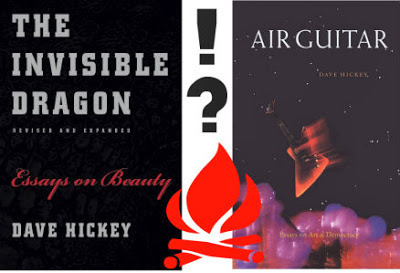 Art is going through a "stupid phase", that's what art critic Dave Hickey says. Art education is all wrong, it systematically kicks out good ideas and forces students to conform.
Art is going through a "stupid phase", that's what art critic Dave Hickey says. Art education is all wrong, it systematically kicks out good ideas and forces students to conform. And what do they conform to? To the notion that all past ideas, styles, techniques etc in art history should be rejected . That nothing can be learned from past masterpieces.
There are no valid models. As famous art critic Arthur Dando once said (he recently died): art history is over .
The empty slate.
As a result, says Dave Hickey, little good art is done, indeed creativity in art is not allowed and not possible. Mediocrity is institutionalized, hence his provocative contention: art is going through a stupid phase .
By abandoning beauty, the art world has "descended into the hell of boredom", and that, says Laurie Fendrich, a professor of fine arts at Hofstra University, is the major theme of his books on art - see here her excellent article in The Chronicle of Higher Education; in particular, you'd want to get two of his books, both very short: The Invisible Dragon: Four Essays on Beauty (first published by Art Issues Press, 1993) and Air Guitar (1997).
 Other pearls from Dave Hickey: rich collectors are ruining art by buying and selling art strictly as an investment; art museums and philanthropic art organizations are bureaucratizing creativity.
Other pearls from Dave Hickey: rich collectors are ruining art by buying and selling art strictly as an investment; art museums and philanthropic art organizations are bureaucratizing creativity. But don't believe for one minute that Hickey's definition of "beauty" is linked to some permanent notion like "quality" (he derides it). No, for him, beauty is "relative", it differs from one person to the next, one group to the next, one generation to the next. But it's there, tangible.
Hickey is proud of his ability to pick winners: he was among the first to see the value of abstract painter Tim Bavington and the transcendent graffitist Gaijan Fujita.
Do you agree? Do you think that in abandoning the concept of beauty, contemporary artists have become boring, repetitive and ultimately irrelevant?
But wait... His books are very successful in the art world, academicians, students and critics keep reading them, even twenty years after they've been first published. Could that herald a change of heart in the art world? Is the current "stupid phase" really destined to end?
If so, it's taking a darn long time to pass...
Related articles
 Groundbreaking Art Critic Arthur Danto Dies at 89(abcnews.go.com)
Groundbreaking Art Critic Arthur Danto Dies at 89(abcnews.go.com)
 Dave Hickey Is Not Quite Disappearing(theonlinephotographer.typepad.com)
Dave Hickey Is Not Quite Disappearing(theonlinephotographer.typepad.com)










Published on December 21, 2013 07:27
December 18, 2013
Italy's Forconi: Another Occupy Wall Street?
 The protest movement, called "i Forconi" (the "Pitchforks") started a year ago in Sicily and quickly spread to the whole peninsula, as far as Venice, which, in itself, is a rare event in a country that is deeply "regionalized", where the North despises the South and the South hates the North, where every region considers itself more important than the whole.
The protest movement, called "i Forconi" (the "Pitchforks") started a year ago in Sicily and quickly spread to the whole peninsula, as far as Venice, which, in itself, is a rare event in a country that is deeply "regionalized", where the North despises the South and the South hates the North, where every region considers itself more important than the whole.What makes the movement stand out and different from the various protests spawned off by the 2008 Big Recession?
If you read the international press (see below The Guardian's article) and even the Italian press (see La Stampa here), you get the feeling that this is a patchwork of ragtag malcontents drawing together disparate groups, from truck drivers to students, with few ideas in common except general protest against the system. Some see echoes of the start of Mussolini's fascist movement, and the current "march on Rome" of the more extremist wings of the movement (Casapound etc) seem to confirm their suspicions. Wild ideas abound. When one of their spokesman in Turin talked of "Italy in the hands of Jewish bankers", the statement echoed painfully in Israel where it was taken as a direct slur.
But it's more complicated than that. Over the next few days, we'll see whether this is just a populist uprising destined to fail, disappearing in rivulets of nonsensical, extremist protest, or whether it is something that needs to be entered into the equation of Italian politics. Two aspects stand out:
1. The moderates, the so-called "dialoganti" (ready for dialogue), led by the Sicilian Mariano Ferro, are NOT participating in the Forconi march on Rome of 19 December where the leader of the "duri" (the tough ones), Danilo Calvi expects to fill a piazza (only 15,000 people according to police estimates);
2. instead, the moderates plan to meet the Pope on Sunday 22 December and negotiate with the Rome mayor to obtain the use of a piazza for a prolonged, peaceful occupation à la Occupy Wall Street.
Will the "soft" protest win over the tough one? With the Pope's help, this is very likely. And it is a very smart move on the part of Mariano Ferro.
Who is he? He's a farmer from Avola, a small town near Syracuse, the center of a productive agricultural area (wine, oranges) famous for having the best pastry shops in Sicily (if you go through Avola, stop for a cannolo filled with sweet ricotta and a glass of Nero d'Avola, not together of course!). He is 53 years old, a small agricultural entrepreneur, and he insists he is a pacifist and that most "forconi" are not violent. A recent poll indicated that only 19 percent were extremists - he is clearly betting that he will become the major leader of the movement. Here he is (looking more reliable and honest than fuzzy-haired comedian Beppe Grillo):

But his move to negotiate with the Rome authorities and meet the Pope is not appreciated by the extremists in the movement, as this exchange of insults on Facebook shows:

"You're a traitor, a clown, a turncoat etc etc"
Tempers are rising in Italy, and it is difficult to see how the Government, particularly since it is a center-left one, can ignore the protests...
Personally, I think it is about time that austerity policies are thrown in the bin where they belong but that the necessary reforms of government expenditures and social security are also made and that people start paying taxes as they should!
Could Mariano Ferro be the next Beppe Grillo? I hope so, he's definitely better news than old Beppe.
Related articles
 I Forconi(nationalreview.com)
I Forconi(nationalreview.com)
 Italy: Fascism at the end of a pitchfork(presseurop.eu)
Italy: Fascism at the end of a pitchfork(presseurop.eu)
 Italy Is 'Slave to Jewish Bankers,' Populist Leader Declares(jewishpress.com)
Italy Is 'Slave to Jewish Bankers,' Populist Leader Declares(jewishpress.com)










Published on December 18, 2013 01:11
December 17, 2013
Are You Afraid of Death?
We all live under the threat of death, we all yearn for immortality. Who wouldn't want to avoid Death?
Stephen Cave, the author of the best selling book Immortality: The Quest to Live Forever and How it Drives Civilization, recently gave a talk on TED and it's amazing, take a look:
He goes through the four basic stories or narratives that humanity tells itself in order to overcome its fear of death - incidentally, the four essential plot lines that we writers always tend to write about - and he's given them striking names:
elixir; resurrection; soul; legacy.
What I love best is his comparison of life to a book: bound by the cover (our birth) and the last page (our death). And, as he says, the only thing that matters is not dying but that you make out of your life a "good story":
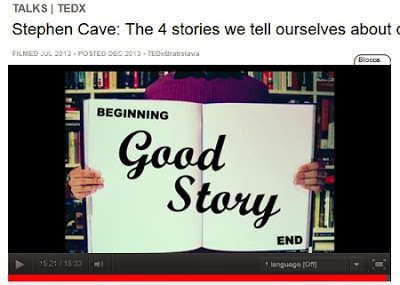
This is so true. When someone dies too soon, like a child or a young adult, or when someone dies having lived a sad, inconclusive life with much pain and loss, then Death is awful - unless you can see it as something that has mercifully put an end to that pain...
As a writer, I believe death plays a huge role in our lives and our books - often prodding us to write. How do you feel about it?
Related articles Stephen Cave: The 4 stories we tell ourselves about death(myteducation.wordpress.com)
Stephen Cave: The 4 stories we tell ourselves about death(myteducation.wordpress.com)
 Happy birthday, Camus! Or, life is meaningless and birthdays don't even matter.(tedx.com)
Happy birthday, Camus! Or, life is meaningless and birthdays don't even matter.(tedx.com)
 The Four Stories We Tell Ourselves About Death (YouTube)(jerichobrisance.com)
The Four Stories We Tell Ourselves About Death (YouTube)(jerichobrisance.com)
 My Writing, My Legacy(martadelannoy.wordpress.com)
My Writing, My Legacy(martadelannoy.wordpress.com)










Stephen Cave, the author of the best selling book Immortality: The Quest to Live Forever and How it Drives Civilization, recently gave a talk on TED and it's amazing, take a look:
He goes through the four basic stories or narratives that humanity tells itself in order to overcome its fear of death - incidentally, the four essential plot lines that we writers always tend to write about - and he's given them striking names:
elixir; resurrection; soul; legacy.
What I love best is his comparison of life to a book: bound by the cover (our birth) and the last page (our death). And, as he says, the only thing that matters is not dying but that you make out of your life a "good story":

This is so true. When someone dies too soon, like a child or a young adult, or when someone dies having lived a sad, inconclusive life with much pain and loss, then Death is awful - unless you can see it as something that has mercifully put an end to that pain...
As a writer, I believe death plays a huge role in our lives and our books - often prodding us to write. How do you feel about it?
Related articles
 Stephen Cave: The 4 stories we tell ourselves about death(myteducation.wordpress.com)
Stephen Cave: The 4 stories we tell ourselves about death(myteducation.wordpress.com)
 Happy birthday, Camus! Or, life is meaningless and birthdays don't even matter.(tedx.com)
Happy birthday, Camus! Or, life is meaningless and birthdays don't even matter.(tedx.com)
 The Four Stories We Tell Ourselves About Death (YouTube)(jerichobrisance.com)
The Four Stories We Tell Ourselves About Death (YouTube)(jerichobrisance.com)
 My Writing, My Legacy(martadelannoy.wordpress.com)
My Writing, My Legacy(martadelannoy.wordpress.com)










Published on December 17, 2013 00:29
December 14, 2013
MASTERPIECE: The TV Reality Show for Writers Becomes...MASTERPIZZA!
Masterpiece, a talent show to find the Next Big Writer? You can count on the Italians to come up with the answer: MASTERPIZZA!
It's official, it's on Facebook, see here.
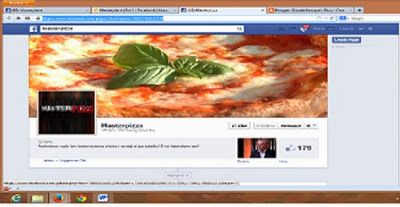
Some of it is funny, some less so. A few chosen bits of pizza:
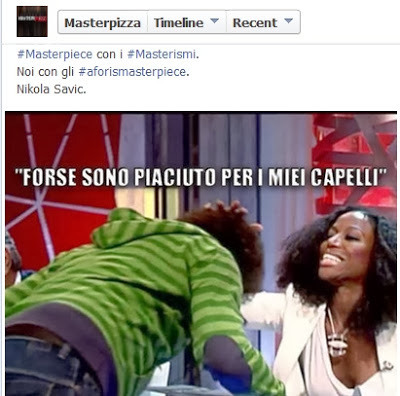
One of the aspiring writers (Nikola Savic) who won, here with judge Taiye Selasi: "Maybe she liked me because of my hair?"

Another judge, author Andrea De Carlo: "I'm sorry there's no prize for the worst book".
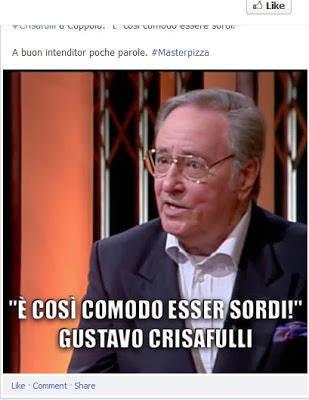
Another aspiring writer, Gustavo Crisafulli: "It's so convenient to be deaf!"
Making fun of the show is another (clever?) way to promote it...









It's official, it's on Facebook, see here.

Some of it is funny, some less so. A few chosen bits of pizza:

One of the aspiring writers (Nikola Savic) who won, here with judge Taiye Selasi: "Maybe she liked me because of my hair?"

Another judge, author Andrea De Carlo: "I'm sorry there's no prize for the worst book".

Another aspiring writer, Gustavo Crisafulli: "It's so convenient to be deaf!"
Making fun of the show is another (clever?) way to promote it...









Published on December 14, 2013 12:03
December 11, 2013
Germany and France: Why They No Longer Lead Europe
 Why is Europe collapsing? Why is the ideal of a United States of Europe forgotten? Everyday, the news bring us another painful episode in the ridiculous Euro crisis with no end in sight while the Eurozone allows some of its members, like Greece, to sink into oblivion - Greece has already lost one quarter of its GNP since the start of the crisis, five years ago, unemployment among the young is at 60 percent, making any downturn in America look like a walk in paradise.
Why is Europe collapsing? Why is the ideal of a United States of Europe forgotten? Everyday, the news bring us another painful episode in the ridiculous Euro crisis with no end in sight while the Eurozone allows some of its members, like Greece, to sink into oblivion - Greece has already lost one quarter of its GNP since the start of the crisis, five years ago, unemployment among the young is at 60 percent, making any downturn in America look like a walk in paradise.I'll tell you why. Not only is our political class no longer committed to the ideal of Europe, the citizens of Europe as a whole are the real culprits. They've become Americanized, they can only think of making money for themselves. Not a shred of idealism left, no compassion for the plight of our fellow Greeks or Portuguese or Irish or whatever. Whoever is poor is wrong and deserves to stay poor. I once blogged that while America has a tea party, Europe has a beer party (see here) and all I can say is that three years later, it is still painfully the case. Europe is in the hands of a ruthless Germany that thinks only of itself and Europe be damned!
True, Merkel repeatedly talks about "more Europe" as a solution but then she does precious little to make it come about. Yet it would be so easy to solve: integrate the fiscal systems, create a unified banking system across the Eurozone. Sure, it's complex technically but it can be done. Ah yes, but that requires political will. And where has it gone? Into beer drinking!
Politicians that are inspired and dedicated to Europe no longer exist. I was sharply reminded of that last night as I watched Valéry Giscard d'Estaing and Helmut Schmidt debate of their European adventure when they were both leaders of their country, back in the late 1970s- early 1980s and the first to launch the Franco-German entente to lead Europe. Today, they're both ancient gentlemen, Schmidt, 95 years old and smoking like a chimney, Giscard, eight years younger and looking very fit, as if he'd just walked out of one of P.G. Wodehouse novels featuring Jeeves.

Helmut Schmidt remarked that Europe had grown too big to be manageable: in his time, the EU had 9 members, now it has 28. Giscard rejoined that small countries should not have an equal voice in decision-making - their desires and identity should be respected, but they ought to combine in sub-regional groups. I suppose he was thinking of the likes of Benelux. Schmidt looked rather dubious.
But both agreed that the way forward was blocked by politicians who thought more about winning re-election in their own country than moving Europe forward.
Merkel, that message is for you!
Image sources: 1. Europe Satellite image, Planet Observer
2. my screen shot of Helmut Schmidt and Valéry Giscard d'Estaing on Arte TV. You can see their talk here.
Related articles
 Ex Greek FinMin Warns "Europe's North-South Divide Has Become A Time Bomb"(zerohedge.com)
Ex Greek FinMin Warns "Europe's North-South Divide Has Become A Time Bomb"(zerohedge.com)
 Europe R.I.P: The Germans Killed You!(claudenougat.blogspot.com)
Europe R.I.P: The Germans Killed You!(claudenougat.blogspot.com)
 Spoof photos try to "de-dramatise" the "Franco-German couple"(irishtimes.com)
Spoof photos try to "de-dramatise" the "Franco-German couple"(irishtimes.com)










Published on December 11, 2013 01:49
December 10, 2013
The Challenge of Changing Genre: Two Authors' Experiences - Robert Stone and Suzy Turner
 Writers do change genres, say going from romance to thrillers, and when they do, they risk losing their fans. That's why publishers generally insist on writers taking on a new pen name.
Writers do change genres, say going from romance to thrillers, and when they do, they risk losing their fans. That's why publishers generally insist on writers taking on a new pen name. But some don't.
Notably, Robert Stone, dubbed a "literary giant" by the Wall Street Journal (see article below), hasn't bothered. He has just come out with a short thriller, "Death of the Black-Haired Girl" in contrast to everything he's written before (complex dramas with multiple narrative threads coming together).
Moreover, he's stacked the chances against himself: he hasn't published a best-selling novel in 15 years and his previous novel came out in 2003. He admits he's slow and procrastinating... Yet on Amazon, his new book is steadily gathering reviews (23 at the time of writing this post) and is ranked #19 in literary psychological fiction and #31 in literary thrillers. Doing pretty well. I would say he hasn't lost his readership, even though, the reviews are mixed, his overall rating is 3 stars out of 5 (see here; many thought the book too short and the characters not likeable.)
So there is some danger in changing genre but also hope for a writer to stick to his name and still succeed.
It's a toss-up.
Personally, I think it can be done (and I've done so, moving from Young Adult paranormal romance to literary contemporary fiction and now science-fiction). But I thought I'd ask fellow writer Suzy Turner her opinion as she has just changed genre. When I first met her, she was writing YA paranormal and had a successful series going, called "The Raven Saga". Now, with her latest book, "Forever Fredless", a light romantic comedy, she's into women's fiction.
Claude: Suzy, can you tell us briefly why you decided to write in a new genre?
 Suzy Turner
Suzy TurnerSuzy: Of course. In my early twenties I began to write what I loved and at that time it was chick lit. I'd grown up reading it and it just seemed the natural genre for me to write in. However, some years later I was introduced to another genre that also piqued my interest. That was the YA urban fantasy genre. I just knew that I wanted to write for that audience too, so I changed what I wrote for a while until I eventually decided it was time to go back to my former passion, hence my releasing my latest novel, "Forever Fredless".
Claude: Can I be a little provocative? To tell you the truth I never really liked the term "chick lit", there is a connotation about it that comes out fully into its own when you compare it to its "older" pendant called "hen lit" (honestly!) and I've never felt comfortable with such terminology referring to chicken and hen... I much prefer "women's fiction". How do you feel about this controversy?
Suzy: I'm really okay with it, to be honest, because that's what we've always called it. To me, chick lit just refers to women's fiction - it's literature for chicks! It's just a fun name... I don't take these things too seriously!
Claude: Cool! In fact you're right, these are just quibbles. Let me get to a crucial point: in spite of the genre change, and contrary to much of the standard advice in the industry, you haven't changed your name. What would be your advice to anyone contemplating a genre change?
Suzy: One of the reasons I didn't change my name is because I write books that can be read by the same audience - both young adults and women therefore I'm probably not best placed to give such advice! If you're planning a complete genre change, for example from YA to erotica then I would strongly advise you to take on a pen name for obvious reasons. The only other advice I can give is to write what you love, which is exactly what I do.
Claude: I noticed your book cover is noticeably changed from the style of all your other book covers. And rightly so, it fits your new genre. Do you believe that change is enough to signal to your readers the new genre and is there anything else you've done to draw your readers' attention to the change?
Suzy: I just wanted the new cover to appeal to women who love chick lit and I believe my designer achieved that, especially with the lovely, girly colors! The only other thing I've done is to create a completely new blog dedicated to all things chick lit - www.fictiondreams.com which has allowed me to reach a wider audience. But I still blog on my YA blog too at www.suzyturner.blogspot.com
Claude: Wow! How do you find the time to run two blogs and also write your books? You must have a magic trick! Please tell us how you do it, what does your normal workday looks like?
Suzy: To be honest I don't write every day. I only write when I've given myself a deadline to produce a book. Plus, I don't have any other day jobs so I have plenty of time to work on two blogs. When I do have a deadline though, I usually work from 10am to 1pm and then sometimes for another hour or two in the afternoon but the rest of the time is dedicated to social networking, blogging, promotion, etc.
Claude: You may not have a day job but it sounds like you are working twice as hard! Plus, you told me you've just spent two weeks working on film making, what is that all about?
Suzy: I actually worked on a movie a couple of years ago, as Script Coordinator but whilst there I met and became friends with a few people. One (Pedro) is a musician/music producer and amateur film maker and the other is a makeup artist. We talked back then about making a proper trailer for my books but over the year or so, that seemed to develop into actually making a short movie, so I wrote the script and we've been shooting it over the past few weeks!
Claude: Congrats, I can't wait to see it! But to go back to your book, "Forever Fredless". How have your readers accepted the change? I noticed you already have 7 reviews in just 8 weeks since it came out, that's pretty good!
Suzy: Thank you. Yes, they have accepted my new book with open arms. So far, I've had only positive reviews. Let's hope it stays that way!
Claude: I'm sure it will and I'm looking forward to seeing your movie and reading your next book! Thanks again for taking to the time to answer my questions.
The moral of the story?
1. Changing genres does not require changing pen name, unless your new genre is one that will definitely not appeal to your "normal" audience (erotica is a case in point!)
2. You can't sit back and expect the change in cover style to do the work for you; an extra marketing push is needed, and Suzy Turner shows one way to do it. There may be many others, for example, joining fora where the genre is discussed, attending writers'conferences focused on that genre.
Please share your experience and advice in the comments, we're looking forward to your views!
 Available on Amazon, click here
Available on Amazon, click hereRelated articles
 Literary Giant Robert Stone Tries a Thriller(online.wsj.com)
Literary Giant Robert Stone Tries a Thriller(online.wsj.com)
 Why I hate the term 'Women's Fiction'(kecoles.wordpress.com)
Why I hate the term 'Women's Fiction'(kecoles.wordpress.com)










Published on December 10, 2013 00:05
December 8, 2013
La Traviata Russian Style: La Scala Was Not Happy!
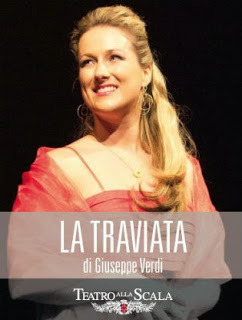 On December 7th, La Scala, probably the most famous opera house in the world, opened the gala season with Verdi's
La Traviata
sung by German soprano Diana Damrau, recently acclaimed at the Metropolitan Opera. The premiere was attended by Giorgio Napolitano, the Italian President and Jose Manuel Barroso, the EU Commission President.
On December 7th, La Scala, probably the most famous opera house in the world, opened the gala season with Verdi's
La Traviata
sung by German soprano Diana Damrau, recently acclaimed at the Metropolitan Opera. The premiere was attended by Giorgio Napolitano, the Italian President and Jose Manuel Barroso, the EU Commission President. The voices were wondrous, Verdi's music magnificent, but Damrau missed her entrance in the second act (!) and the contemporary direction by Russian Dmitri Tcherniakov was heartily booed by the upper balconies. Actually the director, Daniele Gatti, got some boos too.
I wasn't there but watched it on ARTE TV's direct transmission and saw it all. Fascinating.
Here is a picture of the opening:

Act I had some odd costumes, including Annina (Violetta's maid) jazzy bright red-haired, close cropped:

When it came to Act II, things became acutely bizarre, with the scene set in the kitchen of a country house that looked like a Russian datcha. Alfredo (Violetta's lover, sung by Piotr Beczala) at various points is seen rolling dough for pizza and cutting vegetables for a minestrone, not a likely activity for a 19th century provincial bourgeois whose unpleasant father is out to save him from the woman he loves, the unfortunate "traviata". The rush into punk explodes in Act III, with the Parisian party hosted by Flora who is inexplicably wearing a huge Indian headdress (why Indian, may one ask?)
A video of the performance can be seen on ARTE, click here.
Related articles
 Breaking: Dismay at La Scala opening night as Violetta misses her Act II entrance(artsjournal.com)
Breaking: Dismay at La Scala opening night as Violetta misses her Act II entrance(artsjournal.com)
 La Scala's 'La Traviata' Opener Gets Mixed Reviews(abcnews.go.com)
La Scala's 'La Traviata' Opener Gets Mixed Reviews(abcnews.go.com)










Published on December 08, 2013 03:11
December 5, 2013
Bitcoin: Is it Really a Currency?
 The bitcoin logoBitcoins are the latest geeky fad - only, it's no joke, a digital currency worth millions of real dollars and often used in illegal transactions, most famously by the Silk Road website, a sort of black market e-Bay in the dark Web that was recently shut down for illegal activities. It was making something like $2 million real dollars a month yet all transactions were in bitcoins.
The bitcoin logoBitcoins are the latest geeky fad - only, it's no joke, a digital currency worth millions of real dollars and often used in illegal transactions, most famously by the Silk Road website, a sort of black market e-Bay in the dark Web that was recently shut down for illegal activities. It was making something like $2 million real dollars a month yet all transactions were in bitcoins. Ever since the US Congress took a look at it, bitcoins have acquired a semblance of legitimacy and have become all the talk on Wall street and in the media. One bitcoin is now worth well over $1,000, outperforming gold, and reports are that the Chinese love it and are quite willing to use it. Bitcoins are theoretically in limited supply - 21 million is the total - as a result of so-called computer "mining", i.e. solving algorithms - a method apparently invented by some unknown Japanese geek some years ago, or so the rumor goes.
Geeks have set up a magazine to help spread the word about it - they call it a "cryptocurrency" and you can learn all about how to manage it on Bitcoin Magazine. This is an active group, conferences are planned around the world, from Toronto to the Philippines, including a Bitcoin Expo 2014 announced for Shanghai. There's also a dedicated website to encourage payments in bitcoins and garner merchants (some 12,000 merchants are said to have joined so far), here's their home page (my screen shot):

It seems that the month of November, in part thanks to Black Friday, has been very lucrative, and they've processed over 55 bitcoin merchant transactions, a 165% increase over October (for more details, see here). A "BitPay Boom"? Maybe...Their (not so secret) hope is to replace credit cards for online shopping.
In spite of all the fanfare, bitcoins so far have been primarily used on gambling sites. So is it a real currency or is it a gambling chip? There is a strong suspicion that it will never make is as a broadly accepted currency on Main Street and that it is just a geeky method of payment reserved for illegal or semi-legal activities - really cool when you don't want your payments to be traced to you.
In my view, the suspicion that it is not a currency at all is well-founded. The fact that it is a method of transaction on the Net that ensures absolute anonymity is its main advantage. And of course that is the reason why it's so appealing to Mafiosi-types as a way of recycling money.
But for a broad legit commercial use, it would need to become stable in value - something it inherently can't do. In the past three weeks, its value has been multiplied by 400 (see article below), it is bound to zigzag more in the future.
Any chances it will ever achieve stability in the long run? No, none at all. And this for two very simple reasons:
1. There are too few bitcoins around and thus not enough depth to the exchange market since it is set at a maximum of 21 million bitcoins: that is not enough and not flexible enough. The means to address variations in value are not there.
2. Bitcoins do not have the institutional support of real currencies. And that is a crucial difference. The US dollar has the Federal Reserve and the banking system, the Euro has the European Central Bank etc etc. There is no Central Bank for bitcoins, nor a dedicated banking system and there won't ever be any: what governments and what banking systems would take on themselves the management of bitcoins? The Chinese? Hmmmm....
The bitcoin world is a virtual casino: you buy bitcoins the way you buy chips in a gambling casino. Real dollars go in, they are used in a vortex of legal, semi-legal and illegal transactions that determine the bitcoin value, and real dollars can be taken out anytime...provided you find someone else willing to gamble in bitcoins!
I've tried to illustrate how it works in the following infogram. My object is to make you see immediately the difference between bitcoins and your credit cards when you buy something online:

Yes, your bitcoins are not linked to any banking system, that is why they are not a currency, merely a digital payments method. Perhaps, our banking system could learn something from the rather sophisticated bitcoin technology to improve the security of online payments that certainly needs improving - that would be a major positive fallout from the bitcoin phenomenon.
How long is the bitcoin phenomenon likely to last? Pretty long, judging from the copy-cat virtual currencies that it has spawn. People just love to gamble.
How important is it for the economy? Not very - at best, it's the equivalent of a virtual Las Vegas...
Related articles
 Bitcoin currency breaks $1,000 mark(bbc.co.uk)
Bitcoin currency breaks $1,000 mark(bbc.co.uk)
 Bitcoin creator and Silk Road founder tied?(money.cnn.com)
Bitcoin creator and Silk Road founder tied?(money.cnn.com)
 Virtual Currency vs. Metal: Will Bitcoin Outperform Gold Again in 2014?(247wallst.com)
Virtual Currency vs. Metal: Will Bitcoin Outperform Gold Again in 2014?(247wallst.com)










Published on December 05, 2013 01:59
December 2, 2013
Reality TV for Writers: What's Wrong with Masterpiece
This is the third week and third episode for Masterpiece, the Italian TV reality show pitting aspiring writers against each other. Now, I believe that we've seen enough to have a judgment as to whether it works or not.
For me, it doesn't.
The show is well done and has some high points:
the elevator pitch given to a literary celebrity; this time it was Silvia Avallone, a brilliant new author whose first book has already been translated and sold in 28 countries;the reality immersion tests that provide for the contestants contrasting and intriguing views on our society ; this time two of the contestants (male) attended a show for muscular men and women where vitamins, strengthening pills and equipment are sold:

Versus life in a convent (the two contestants were women plunged for two days among nuns):
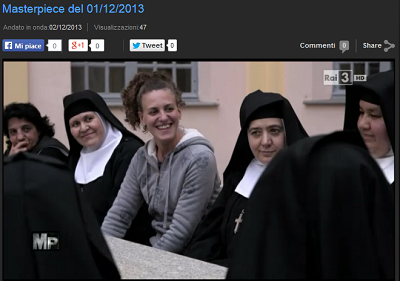
Clearly two worlds that couldn't be further apart both visually and culturally.
But there's a problem for viewers. Each week, a dozen new contestants are introduced and we, as viewers, are expected to interest ourselves to a minimum of 9 new writers, out of which four are eventually selected and then again, only one wins out in the end. Each comes with his/her own novel and personality. Too much to digest!
The only people who remain the same from one episode to the next are the three from the jury and the coach. That's too little and of course, they are not the contestants, we can't become their fan or root for them.
For this to work as good reality TV, we'd need to have at least one of the contestants, the winner of an episode, to take part in the next episode and be challenged by three new writers. That would make us remember to turn on our TV and look for the show, see if last week's winner survives the challenge.
As it was, I forgot to look at it last night and ended up viewing it this morning on my computer. You can see it here, it's aired on RAI TV's website for Masterpiece.
I feel sad...I really thought Reality TV could be a cool way to revive the general public's interest in reading and, at the same time, launch new writers on the scene. I still think it can be done, but for the show to become successful, it would need to have fewer contestants and better focus on a winner that has to undergo repeated challenges: this would help build up suspense and make us want to see the next episode.
Perhaps it's too late to change it now, the rules of the reality game have been set down and are probably, for all sorts of technical reasons, impossible to modify. But in future, consideration should be given to a different model of competition that would aim at maintaining the audience's interest throughout the series.










For me, it doesn't.
The show is well done and has some high points:
the elevator pitch given to a literary celebrity; this time it was Silvia Avallone, a brilliant new author whose first book has already been translated and sold in 28 countries;the reality immersion tests that provide for the contestants contrasting and intriguing views on our society ; this time two of the contestants (male) attended a show for muscular men and women where vitamins, strengthening pills and equipment are sold:

Versus life in a convent (the two contestants were women plunged for two days among nuns):

Clearly two worlds that couldn't be further apart both visually and culturally.
But there's a problem for viewers. Each week, a dozen new contestants are introduced and we, as viewers, are expected to interest ourselves to a minimum of 9 new writers, out of which four are eventually selected and then again, only one wins out in the end. Each comes with his/her own novel and personality. Too much to digest!
The only people who remain the same from one episode to the next are the three from the jury and the coach. That's too little and of course, they are not the contestants, we can't become their fan or root for them.
For this to work as good reality TV, we'd need to have at least one of the contestants, the winner of an episode, to take part in the next episode and be challenged by three new writers. That would make us remember to turn on our TV and look for the show, see if last week's winner survives the challenge.
As it was, I forgot to look at it last night and ended up viewing it this morning on my computer. You can see it here, it's aired on RAI TV's website for Masterpiece.
I feel sad...I really thought Reality TV could be a cool way to revive the general public's interest in reading and, at the same time, launch new writers on the scene. I still think it can be done, but for the show to become successful, it would need to have fewer contestants and better focus on a winner that has to undergo repeated challenges: this would help build up suspense and make us want to see the next episode.
Perhaps it's too late to change it now, the rules of the reality game have been set down and are probably, for all sorts of technical reasons, impossible to modify. But in future, consideration should be given to a different model of competition that would aim at maintaining the audience's interest throughout the series.










Published on December 02, 2013 03:03
November 27, 2013
A Traditional Publisher's Unusual Experiment to Discover the Next Big Author: Does it Work?
 "You Crime" is the name of a traditional publisher's digital imprint that is a unique experiment to try and discover the Next Big Author. The publisher has attempted to unite digital forces with self-published authors in the brave new online world, something that, as far as I know, hasn't been attempted anywhere yet except here, in Italy.
"You Crime" is the name of a traditional publisher's digital imprint that is a unique experiment to try and discover the Next Big Author. The publisher has attempted to unite digital forces with self-published authors in the brave new online world, something that, as far as I know, hasn't been attempted anywhere yet except here, in Italy. If nothing else, it shows how innovative the Italian publishing industry has become, e.g. "Masterpiece", the literary reality show on TV that I recently blogged about.
"You Crime" was launched this summer by Rizzoli (RCS Media Group), the largest Italian publisher, with the publication by its digital division RCS Libri, of four e-books of crime fiction short stories.
What is so remarkable about this?
The publishing formula! The concept is simple:
1. publish a collection of short stories but not too many, just four (don't overwhelm your readers!);
2. the lead story is from an established author with a solid fan base, the other three are from aspiring authors;
3. at the end of the e-book, give readers a link where they can vote for their favorite story/author;
4. let the participating authors promote the book and use every marketing tool at their disposal - as Vena puts it: "authors are expected to self-promote and self-sell their own books on the usual e-retail channels, as if they were self-publishing".
The winner in this unusual competition is the one who gathers the greatest number of votes from readers.
Now this is a really clever way of providing exposure to newbies and test the market without, as a publisher, running risks on an unknown author. Incidentally, it re-exhumes an old Italian tradition of publishing anthologies that contain both established authors and new ones.
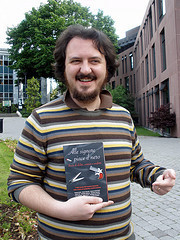 Simone SarassoEach of the 4 books published was thus headed by a best-selling author (see one of the cool covers above; The lead author for this one is Simone Sarasso, if you don't know who he is, you can find him here).
Simone SarassoEach of the 4 books published was thus headed by a best-selling author (see one of the cool covers above; The lead author for this one is Simone Sarasso, if you don't know who he is, you can find him here). The ability of the participating newbies to promote their own work was tested, only the market-savvy authors got ahead. In fact, aspiring authors were selected not only according to the quality of their submission but also on the basis of their networking ability and online presence. Unsurprisingly, in this "editorial digital selection" process, only those with proven "digital marketing potential" were included.
How did the project fare?
According to e-publishing guru, Mike Shatzkin, it worked very well indeed (see here) and it is worth replicating elsewhere and, in my opinion, in other genres too. All four books sold well, by the end of summer, they had made it in the top 50 (in a list of over 4,000 titles) for Rizzoli throughout the entire Italian e-book market, including in the Kindle store (the titles were DRM-free). And some of the newbies included in the experiment have now their own novels under contract for publication with Rizzoli.
The experiment was surely tilted in favor of success: the 12 aspiring authors were pushed to do a maximum of book promotion knowing that at the end of the rainbow they could get a contract with Rizzoli; the publisher could count on the support of one of Italy's major newspapers, the Corriere della Sera, part of the RCS Media group. Suspense from the selection of an overall winner among the 12 newbies added to the heat of the competition. Eventually, Gabriele Santoni made it and was declared a "Rizzoli First Author in 2014", for his short story titled "Die Twice".
The director of the project, Marcello Vena, the head all of RCS Libri's digital experiments, told Publishing Perspectives (see article here) that the results "exceeded expectations" and that they are considering testing the model in more genres. It will be interesting to see if American and British publishers follow their example...
The "You Crime" model is cleverly built on the well-tested formula that "success breeds success", but in this case what is totally new is that the door was opened to aspiring writers - a very different situation from the one facing self-published authors who find themselves generally shunned by traditional publishers. A most welcome change!
What do you think of this experiment? Could it work for you or does it go counter to your view of what a publisher should do?
Related article for my Italian readers: You Crime 2013 - Co-publishing










Published on November 27, 2013 00:29



